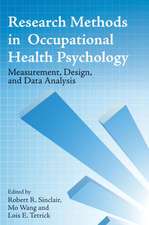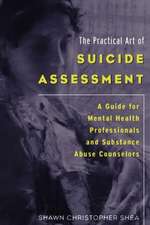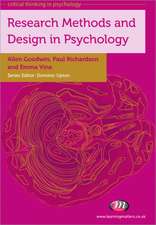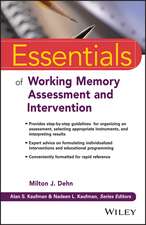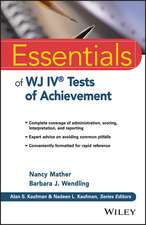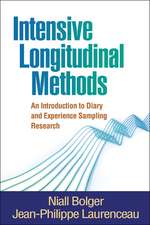Validity in Educational and Psychological Assessment
Autor Paul E Newton, Stuart D Shawen Limba Engleză Paperback – 14 apr 2014
- What does 'validity' mean?
- What does it mean to 'validate'?
- How many different kinds of validity are there?
- When does validation begin and end?
- Is reliability a part of validity, or distinct from it?
Preț: 390.71 lei
Nou
Puncte Express: 586
Preț estimativ în valută:
74.76€ • 78.06$ • 61.88£
74.76€ • 78.06$ • 61.88£
Carte tipărită la comandă
Livrare economică 04-18 aprilie
Preluare comenzi: 021 569.72.76
Specificații
ISBN-13: 9781446253236
ISBN-10: 1446253236
Pagini: 280
Dimensiuni: 170 x 242 x 20 mm
Greutate: 0.48 kg
Ediția:New.
Editura: SAGE Publications
Colecția Sage Publications Ltd
Locul publicării:London, United Kingdom
ISBN-10: 1446253236
Pagini: 280
Dimensiuni: 170 x 242 x 20 mm
Greutate: 0.48 kg
Ediția:New.
Editura: SAGE Publications
Colecția Sage Publications Ltd
Locul publicării:London, United Kingdom
Recenzii
'Countless books have addressed validity, but this is the first volume to provide a comprehensive treatment of the evolution of validity theory in the last century and a framework for evaluating educational and psychological testing in the 21st century.'
'In this groundbreaking book, Newton and Shaw show how the "consensus" view of validity—that validity is not a property of tests, but of inferences made on the basis of the evidence they elicit—was at best rather shallow. Notably, the "consensus" view leaves unresolved important tensions between those who see validation as a never-ending process (e.g., Cronbach, Messick) and those who understand the needs of those who produce assessments to be able to say that they have undertaken necessary due diligence to attest to the quality of assessments (e.g., Ebel, Kane). As well as providing an excellent, scholarly review of the history of the idea of validity, Newton and Shaw show how a modified version of Messick's facet model of validity can produce a rigorously grounded, and yet practical, approach to assuring the quality of educational and psychological assessments. Every serious scholar of assessment should read this book.'
'At last - a scholarly and well-argued book that means validity, the key concept in any assessment, is no longer an essentially American debate. Its scope, logic and clarity will quickly make it the standard international text.'
'With concerns over the validity of educational and psychological tests and assessments growing, this book by Paul Newton and Stuart Shaw is a welcome, and much needed, contribution to the measurement literature. Anyone concerned with the technical quality and value propositions surrounding large-scale testing and assessment ought to read this book. Newton and Shaw take the reader through the history of “validity” as researchers across time and across disciplines use the term. In doing so, they advance the debate by offering a unique and novel framework for assessing issues of test validity. Newton and Shaw leave us with some new concepts—theoretical plausibility and practical viability—for judging the evidence in support of a test’s validity. This book presents today’s and tomorrow’s perspectives on validity as the core idea in educational and psychological assessment. It is a must read for those working in the broad field of psychometrics.'
[This book] was enlightening in terms of helping me reflect on a range of issues around testing and validity. It provides a good way of thinking about these issues in a way that takes into account a range of views from different stakeholders about why a particular testing policy exists. The framework enables different agendas to be made explicit and tensions between different purposes of a particular policy laid bare. It provides a way of critically evaluating policy and making decisions about implementing testing and assessment policies. I wish I had read this book before writing a sub chapter called 'Why Assess?' - covering the same ground on issues of dyslexia assessment would have been easier using Newton and Shaw's revised framework...I would recommend the book to experienced practitioners who want to reconsider the validity of assessments that they undertake. It is perhaps useful for trainers as a book that enables trainee psychologists to consider the social context in which psychometric measures are used and to consider validity in terms which take them beyond the technical aspects of testing and assessment. It is also a useful book for policy makers to consider, especially around the social issues related to assessment and testing policy implementation.
An ideal text for post-graduate courses on educational or psychological assessment, and selections would also make strong contributions to reading lists for under-graduate courses. There is plenty in it for more seasoned scholars of assessment theory as well ... because the historical survey and analysis of the literature is so insightful
In an accessible, statistics-free treatment, Newton and Shaw first distinguish assessment validity from related concepts (such as research validity), before tracing its evolution through the primarily US-led assessment research tradition over the past century. As doctoral students we hope to tap into issues at the cutting edge of the field, and Newton and Shaw’s book enables this, providing the background and theory needed to contribute to contemporary assessment research.
'In this groundbreaking book, Newton and Shaw show how the "consensus" view of validity—that validity is not a property of tests, but of inferences made on the basis of the evidence they elicit—was at best rather shallow. Notably, the "consensus" view leaves unresolved important tensions between those who see validation as a never-ending process (e.g., Cronbach, Messick) and those who understand the needs of those who produce assessments to be able to say that they have undertaken necessary due diligence to attest to the quality of assessments (e.g., Ebel, Kane). As well as providing an excellent, scholarly review of the history of the idea of validity, Newton and Shaw show how a modified version of Messick's facet model of validity can produce a rigorously grounded, and yet practical, approach to assuring the quality of educational and psychological assessments. Every serious scholar of assessment should read this book.'
'At last - a scholarly and well-argued book that means validity, the key concept in any assessment, is no longer an essentially American debate. Its scope, logic and clarity will quickly make it the standard international text.'
'With concerns over the validity of educational and psychological tests and assessments growing, this book by Paul Newton and Stuart Shaw is a welcome, and much needed, contribution to the measurement literature. Anyone concerned with the technical quality and value propositions surrounding large-scale testing and assessment ought to read this book. Newton and Shaw take the reader through the history of “validity” as researchers across time and across disciplines use the term. In doing so, they advance the debate by offering a unique and novel framework for assessing issues of test validity. Newton and Shaw leave us with some new concepts—theoretical plausibility and practical viability—for judging the evidence in support of a test’s validity. This book presents today’s and tomorrow’s perspectives on validity as the core idea in educational and psychological assessment. It is a must read for those working in the broad field of psychometrics.'
[This book] was enlightening in terms of helping me reflect on a range of issues around testing and validity. It provides a good way of thinking about these issues in a way that takes into account a range of views from different stakeholders about why a particular testing policy exists. The framework enables different agendas to be made explicit and tensions between different purposes of a particular policy laid bare. It provides a way of critically evaluating policy and making decisions about implementing testing and assessment policies. I wish I had read this book before writing a sub chapter called 'Why Assess?' - covering the same ground on issues of dyslexia assessment would have been easier using Newton and Shaw's revised framework...I would recommend the book to experienced practitioners who want to reconsider the validity of assessments that they undertake. It is perhaps useful for trainers as a book that enables trainee psychologists to consider the social context in which psychometric measures are used and to consider validity in terms which take them beyond the technical aspects of testing and assessment. It is also a useful book for policy makers to consider, especially around the social issues related to assessment and testing policy implementation.
An ideal text for post-graduate courses on educational or psychological assessment, and selections would also make strong contributions to reading lists for under-graduate courses. There is plenty in it for more seasoned scholars of assessment theory as well ... because the historical survey and analysis of the literature is so insightful
In an accessible, statistics-free treatment, Newton and Shaw first distinguish assessment validity from related concepts (such as research validity), before tracing its evolution through the primarily US-led assessment research tradition over the past century. As doctoral students we hope to tap into issues at the cutting edge of the field, and Newton and Shaw’s book enables this, providing the background and theory needed to contribute to contemporary assessment research.
Cuprins
Validity and Validation
The Genesis of Validity: Mid-1800s–1951
The Fragmentation of Validity: 1952–1974
The (Re)Unification of Validity: 1975–1999
The Deconstruction of Validity: 2000–2012
Twenty-first-century Evaluation
The Genesis of Validity: Mid-1800s–1951
The Fragmentation of Validity: 1952–1974
The (Re)Unification of Validity: 1975–1999
The Deconstruction of Validity: 2000–2012
Twenty-first-century Evaluation
Notă biografică
Descriere
Offering an in-depth study of validity, which forms an important part of education assessment, this book addresses complex concepts in a straightforward manner, while guiding the reader through the evolution of validity from the 19th century to the present day.



